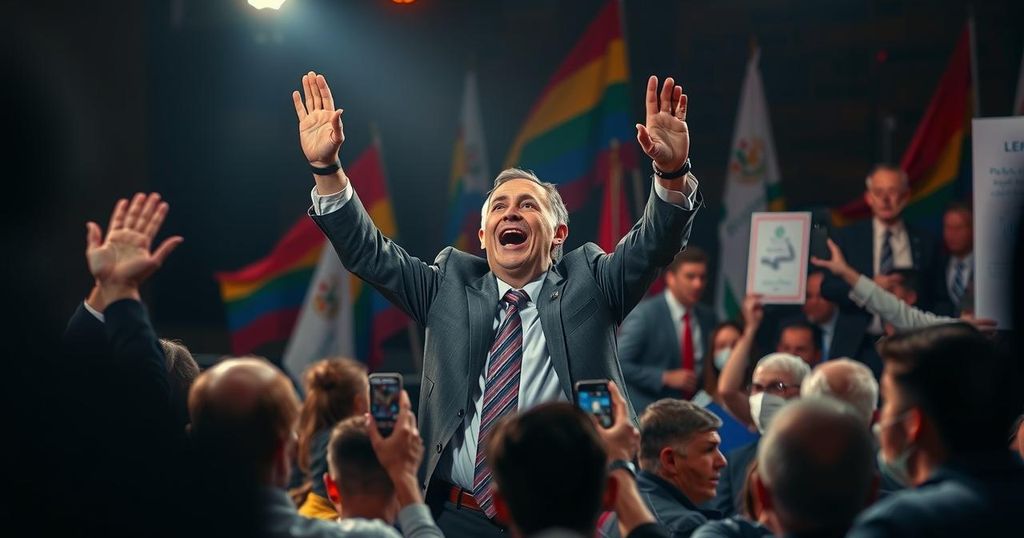Georgian Ruling Party Wins Controversial Election Amid Protests

Georgia’s ruling Georgian Dream party has won the parliamentary elections, securing over 54% of the votes, resulting in 89 seats within a 150-member parliament. The opposition has denounced the election as fraudulent and a constitutional coup. Concerns over violence, voter intimidation, and the future of Georgia’s EU aspirations are dominating post-election discussions.
The electoral commission in Georgia has announced that the ruling Georgian Dream party emerged victorious in the parliamentary elections, amidst ongoing protests from opposition groups who condemned the election as a “constitutional coup.” According to central election commission chair Giorgi Kalandarishvili, with over 99% of precincts reporting, Georgian Dream secured over 54% of the votes. The results indicate that the ruling party will occupy 89 seats in the 150-member parliament, thus maintaining governmental control but falling short of the absolute majority required to implement substantive constitutional amendments. This outcome is perceived as a setback for pro-Western factions in Georgia, who framed the election as a critical choice between a government fostering closer ties with Russia and an opposition eager to expedite integration with the European Union. Observers from Brussels had warned that the election would serve as a pivotal examination of democratic practices in the Caucasus region, affecting Georgia’s ambitions to join the EU. Opposition parties, including the United National Movement (UNM) led by Tina Bokuchava, have declared the results unacceptable, alleging electoral fraud, with Bokuchava stating, “This is an attempt to steal Georgia’s future.” Furthermore, Nika Gvaramia, leader of the Ahali party, labeled the electoral process a “constitutional coup.” Concerns were echoed by Georgian President Salome Zurabishvili, who referenced troubling instances of violence at polling places. A Georgian monitoring organization has called for the annulment of the results, citing reports of voter intimidation, although substantial evidence of widespread fraud has not yet been presented. Social media circulated distressing imagery of ballot stuffing and attacks on election monitors. Bidzina Ivanishvili, the party’s founder, celebrated the election outcome, emphasizing the party’s resilience during challenging circumstances. He expressed confidence in the capability of the Georgian electorate, stating, “It is a rare case in the world that the same party achieves such success in such a difficult situation.” Despite Georgian Dream’s stated intentions to pursue EU membership, the bloc has expressed hesitance, attributing this to the ruling party’s perceived authoritarian inclinations. Ivanishvili’s campaign has promoted a narrative of external threats regarding the war in Ukraine, leveraging fears among voters regarding potential conflict. Citizens have expressed growing concerns about the political trajectory of the country, with voter Tamta Kukhaleishvili articulating: “For me, it’s not a country I want to live in.”
The political landscape in Georgia has experienced significant tension in recent years, particularly concerning governance and foreign relations. The ruling Georgian Dream party has been at the center of controversy, especially regarding its relationships with Western entities and Russia. The EU has put the country’s membership aspirations on hold, citing issues related to governance and freedom. The latest election served as a critical moment for pro-Western supporters who aimed to leverage the vote as a means of steering the nation toward closer ties with European institutions, contrasting sharply with the Georgian Dream’s approach, which has often appeared more favorable towards Russia. The fervent protests from opposition factions following the election underscore the ongoing divisions within Georgian society regarding its geopolitical trajectory.
In conclusion, the recent parliamentary elections in Georgia have solidified the ruling Georgian Dream party’s position in the parliament, despite failing to obtain the necessary majority for constitutional changes. The aftermath of the elections has sparked considerable unrest among opposition groups who allege fraud and manipulation within the electoral process. As the nation grapples with internal dissent and external pressure regarding its EU integration, the prevailing sentiments among citizens reveal a deepening concern regarding the preservation of democratic values and the future trajectory of Georgian politics.
Original Source: www.aljazeera.com








